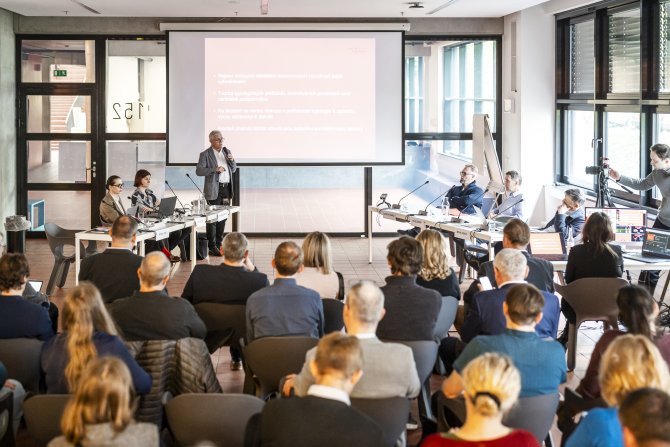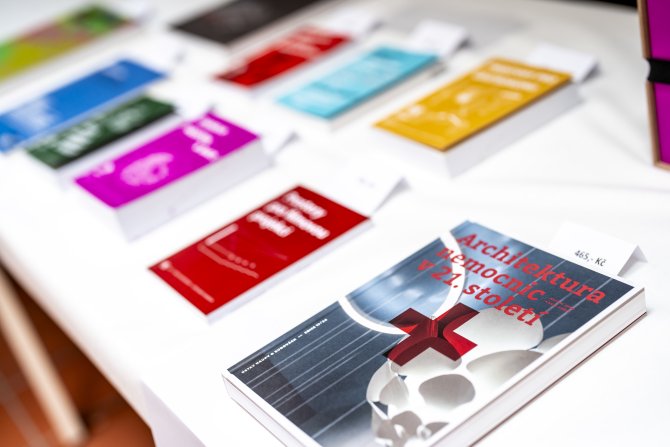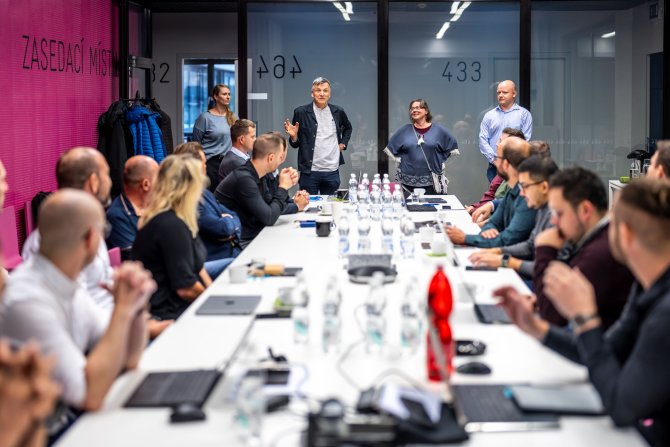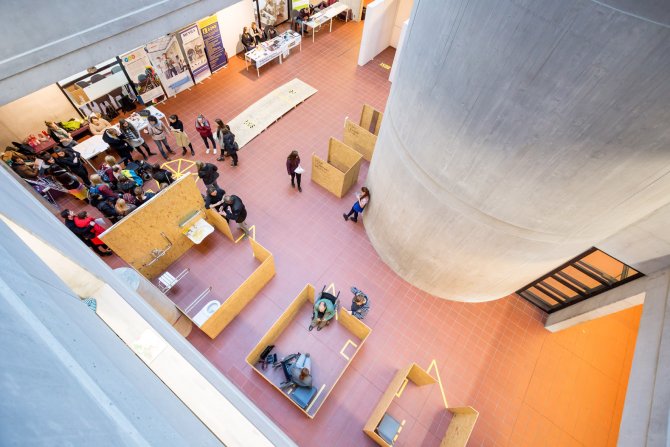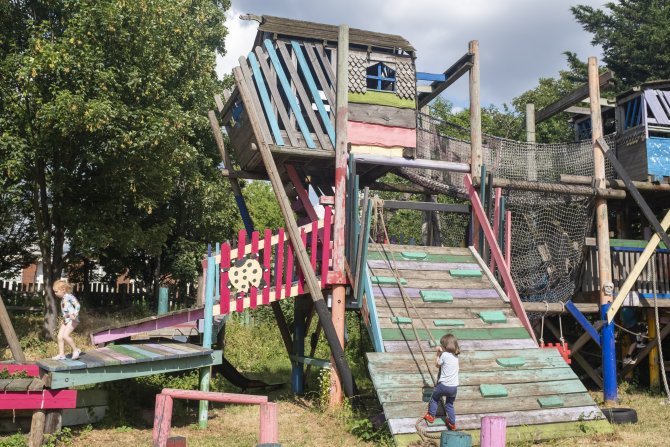Type is cool!
The courses take place in seven theoretical subjects supplemented by six vertical studios, which apply the knowledge and methodology of architectural design. Four basic studios also operate as part of the institute.
The subjects in bachelor studies look at the basics of typology (NS I – Basics of Design; NS II – Residential Buildings), typologies of common civil structures (NS III – Retail, Work, Recreation; NS IV – Culture, Education, Sports) and design and communication methodology (KI – Concept and Interpretation). Both master’s subjects deal with the specifics of the design of large, technologically and operationally complicated buildings, which regularly make up higher citywide, regional and supra-regional facilities (NS V – Large and Operationally Demanding Buildings) and other than typological design strategies (NS VI – Typology in a Post-typological Era).
The employees of the institute participate in several research tasks as part of the assignments of the Czech Science Foundation (e.g. research of environments for people afflicted with Parkinson’s disease under the direction of Professor Šestáková) or the Technology Agency of the Czech Republic (e.g. the team of Professor Kohout and Associate Professor Tichý completed the research of models of social housing in 2017). Research assignments come from state institutions (e.g. a senior housing project ordered by the State Housing Development Fund and an analysis of social housing systems and the publication Housing (not only) for people with disabilities requested by the Ministry of Labour and Social Affairs) and from the private sector (e.g. support of Prague sub-centre research). Some research tasks were supported by the non-profit sector (support of the Visegrad Fund and The Heinrich Böl Foundation for the four-year research project Housing Estates, What Now?). Workers of the institute also participated in the organisation of local and international conferences (European Habitat 2016, European Urban Forum and Architecture for Children in 2017) and the research results are the source for publication activities of the institute.
Department of Building Theory is also an expert workplace for secondary and thematic typology Several workplaces involved in various aspects of the theory of buildings operate informally in the institute, e.g. the Centre of Residential Buildings led by Professor Kohout and Associate Professor Tichý and the Centre of School Buildings concentrated around Associate Professor Stýblo. Professor Šestáková leads two specialised teams: one is oriented on access to the exhibited environment and its adaptation to the needs of specific population groups (seniors, disabled people, people with specific diseases, etc.), the second is Architecture for Children, involved in the relationship between buildings and their youngest users. Professor Navrátil is a specialist in the issue of sports buildings and Associate Professor Fořtl leads a team involved in healthcare buildings.
BUILDING THEORY 1
Students are introduced to the BASICS of scaling and designing spaces grounded in the theoretical and practical experience of the instructors as qualified architects. They acquire a relatively wide range of essential knowledge of various influences on the concept of a building. Emphasis is placed on a holistic perception of architecture across different scales. Seminars are devoted to further work on specific themes from the lectures.
BUILDING THEORY 2
Structures for HOUSING
The primal ‘building block’ of the built environment of human settlements, housing is essentially a task for the everyday, even one where frequent repetition may give the impression that all space for meaningful innovation has been exhausted. Moreover, residential construction is limited by many legal regulations and practical limits. Yet precisely this necessity of operating in an often-limited space, the need to work with the small and this unusual combination of the ordinary and the fateful that residential buildings bring into our lives - all these matters are what make the subject attractive. Here, the architect helps to create a home, and what could be more beautiful? This course takes as its goal revealing to its students beneath the surface of the ordinary a living, dynamically pulsating world of relations, connections, rules, structures and scales, which are key for the capability of freely operating in the field of designing residential buildings.
BUILDING THEORY 3
Basic public infrastructure - COMMERCE, WORK, RECREATION
This course focuses on common public structures related to the presence of human subjects in an environment that they do not usually regard as their individual homes yet nonetheless view as somehow “theirs”. For example, time spent in a workplace environment (office, factory), in unusual life situations or stages (illness, old age, rehabilitation, travel, recreation) or in an environment located close to their own dwellings and serving for everyday use (commerce, dining).
BUILDING THEORY 4
Basic public infrastructure – CULTURE, EDUCATION, SPORTS
This course focuses on common public structures characterised primarily by short-term or long-term operation often related to leisure time or focusing on important social or sporting events. Generally speaking, these buildings are marked by several overlapping and intersecting themes: multipurpose functionality, use of specific structural methods, public assembly spaces and related questions of seating, visibility and acoustics.
BUILDING THEORY 5
Higher City-Wide, Regional and Super-Regional Infrastructure
Large structures, often with significant technical and operational challenges, have their own underlying laws of creation: exceptional urbanistic impact, complicated functional interconnections, building process in stages, unusual construction systems, determining influences of operating technologies - and an emphasis on knowledge and comprehension of the principle of building function. The goal of the course is less the instruction of specific functional designs than the transmission of experience and methods for dealing with unique assignments where detailed knowledge often exceeds the realistic possibilities of an individual expert.
BUILDING THEORY 6
Non-typological strategies for creation of the built environment. In this course, students have the chance to deepen their knowledge of the creation of a build environment through methods other than those grounded in classic empirical typologies. A key part of the course is the presentation of communicative strategies, the harmonising of technical, visual and other possible depictions and presentations of building designs to clients, or work with the public and the media.
CONCEPT AND INTERPRETATION
The interpretation of architecture is inseparable from the question of the purpose of architecture itself. First of all, it is necessary to understand or create the sense of a work, to design a concept and then to be able to formulate, interpret and present it. Such knowledge and capabilities can then serve as the starting point for architectural design, whether as an immediate component or as a tool for its interpretation and presentation. Understood here under the concept of ‘architecture’ is the complex built environment, including landscape work. The operational platform of architecture (and its interpretation or presentation) is expanded by formats that can include e.g. the critical text, artistic concept, publication, exhibition, live presentation, photography, film, online communication technologies etc. Simultaneously, these formats can have not only an interpretive but equally a formative role.
Participants in the individual thematic blocks include external lecturers with expertise in the given topic. Overall, these invited professionals are leading experts in the given problem, with wide-ranging practical experience to draw upon.
This course is intended for future practicing architects. Students can apply their acquired capabilities to the presentation of their currently prepared atelier project, as well as towards the compilation of their own long-term portfolio.
DEVELOPMENT 1
The course Development I - Introduction to Real-Estate Development - introduces students to the basic principles of formulating the requirements and needs of investor preparation, including the basic principles for the realisation of the construction of individual buildings or building complexes, specifically through the form of integration of economic, social and environmental requirements within the setting of an open market economy.
Students will be acquainted with the logical sequencing and relevant levels of detail in the following areas: principles of the real-estate market, investment financing, requirements of private and public investors and the ensuing requirements for managing project risks and opportunities along with the related legislative framework and legal rules.
Within practice exercises, students will be introduced to the forms of professional work using practical examples and case studies involving the preparation of individual aspects of the process, with emphasis on their implementation into the whole and wider project ramifications.
DEVELOPMENT 2
The course Development II introduces students to the basic aspects of project management, the necessary implements involved, creation of project structures, quality fulfilment control, chronological markers and preparation of budgets and costs.
Students will be acquainted with the logical sequencing and relevant levels of detail particularly in the following areas: principles for creating project structures, project cultures, establishing project boundaries, responsibilities within a project team, project planning and administration.
Within practice exercises, students will be provided with work using practical examples and case studies in model situations for creating and managing projects.
DEVELOPMENT MODULE
The goal of studies in this module is a better understanding of development, in other words the preparation, realisation and management of a built environment. It involves expanding the view of the building to include its socio-economic dimension (financing, marketing, sale) and process (legal and management). Upon completion, students should be able to meet the challenges for sustainable, economically feasible and socially responsible construction, and thus find better positions in design or development teams.
Graduates of the program who complete the module acquire, along with the mandatory basic program applicable to all MA architectural studies, a thorough and complex training in the field of real estate development.
The Development (DEV) module has its targeted series of courses and graduation project set so that the graduate could, after meeting the prescribed length of supervised practice, apply to the Czech Chamber of Architects for authorisation to practice. Applications for the Development module must be submitted before the start of the first semester in the first year of MA studies.
OBLIGATORY COURSES
- Development I, II
- Building Theory VI
- Urbanism V, VI, VII
- Land-Use Planning II, III
- Spatial Informatics I
- Atelier ATV
- diploma seminar
ATELIER INSTRUCTION
The ateliers ATSS, ATU, ATVZ, ATRN, ATV must be completed by all students enrolled in the module DEV with a focus on the subject matter. Obligatory assignments for the module Development:
• Atelier – building complex, ATSS: The work will include a basic analysis of the site (history, land-use plan, extant infrastructure and facilities, transport, environmental aspects, morphology, external influences, plans for the area etc.), setting or expanding the program (areas, functions, relationships, concept, target groups, references etc.), setting the main goals – client assignment (purpose, capacity, standard, character, image, references) and concluding proof of their fulfilment.
• Atelier – urbanism, ATU: The work will include a basic analysis of the site (history, socioeconomic parameters land-use plan, extant infrastructure and facilities, public space, transport, environmental aspects, terrain morphology, current construction, external influences, plans for the area etc.), setting or expanding the program (capacity, methods and intensity of spatial use, operating functions, relationships, concept, target groups, references etc.), setting the main goals – client assignment (purpose, capacity, character, image, references) and concluding proof of their fulfilment.
• Atelier – free assignment, ATVZ: The work will concentrate on projects either assigned by public bodies (public project) or private investors (private project) with an investment capital assumed as higher than ca. 100 million CZK. The work will involve formulation of an investment strategy - function, locality, quality, quantity, argument for the chosen locality, formulation of the client assignment for project work based on a feasibility study, integration of the client assignment into the architectural form, layout and structural solution, evaluation of project design and its improvement in terms of future value and investment costs.
• Atelier – realisation project, ATRN: The realisation project is based on the study of the project from previous ateliers. This atelier addresses the continuation in project realisation up until its evaluation and the implementation of the functioning project in simplified form: preparation of documentation and organising the selection of methods and procedures for realising the construction phase of the project, planning a structure for the model resolution of design alterations during its construction realisation, preparation for project transfer, final inspection, cadastral register, defects and incomplete work resolution, guarantees, delay fees, administration and maintenance, insurance, tax accounting classification, technical infrastructure (utility connections - electricity, gas etc.) and project evaluation.
• Atelier – elective, ATV (obligatory for DEV module): Students complete the elective atelier for modelling of their original proposal with the goal of drawing attention to the risk level and impacts on the specific project.
DIPLOMA SEMINAR AND PROJECT
• Diploma seminar, DS (obligatory for DEV module): The diploma seminar will contain, along with basic analysis (history, socioeconomic parameters land-use plan, extant infrastructure and facilities, public space, transport, environmental aspects, terrain morphology, current construction, external influences, plans for the area etc.), as well as setting or expanding the program (capacity, methods and intensity of spatial use, operating functions, relationships, concept, target groups, references etc.), setting the main goals – client assignment (purpose, capacity, character, image, references), in addition the basic information for preparation of a feasibility study (estimate of land value, amount of unit prices for costs and profits).
• Diploma project, DP: The diploma project will contain a basic analysis of the site (history, land-use plan, extant infrastructure and facilities, transport, environmental aspects, morphology, external influences, plans for the area etc.), setting or expanding the program (areas, functions, relationships, concept, target groups, references etc.), setting the main goals – client assignment (purpose, capacity, standard, character, image, references) and concluding proof of their fulfilment. In addition, the project will contain a feasibility study (basic overview of costs and profits, determination of return on investment period, project duration, exit strategy etc.).
The guarantor of studies in the module Development is the Institute of Building Theory. The assignment of the diploma project must be approved by the guarantor of the module if the project is completed at another institute than 15118.
